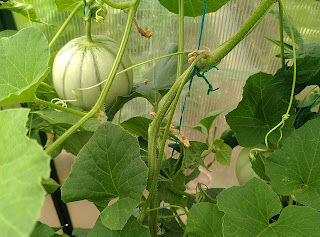Last night it rained. Such a lovely sound. As a result, today has been somewhat cooler.
The garden is hard work at this time of the year, at least for the gardener who picks berries and harvests assorted vegetables and has to weigh the produce and record the yields on his excel sheets and stuff the freezer and make jam and salads and dinners. I join him in the evening picking raspberries and obviously, I am full of praise for all the work he does.
 |
| this year the melons look good |
 |
| spot the one miserly apricot |
 |
| onions and parsnips |
 |
| the raspberries |
 |
| a wild mallow that grew out of nowhere |
 |
| invasive R calls it, taking over |
 |
| abundant feijoa from NZ |
 |
| chicory |
 |
| we call this one dyer's chamomile |
 |
| the yellow day lilies look a bit messy |
 |
| finally the plumeria |
Because I've read it again as an argument why nothing can be done about climate change and also because some of you have mentioned a couple of times in your comments, here my attempt to explain why I think it's a straw argument.
Yes, overpopulation is often used as an explanation for the climate crisis. Almost 8 billion people currently populate the earth so of course, population growth has and will increase global emissions of CO2. But here's the thing, rising incomes have a much greater impact. Because people do not all produce the same amount of emissions. In the richest countries, emissions are 50 times higher than in the poorest countries. And while in the low-income, low-emission countries the population is growing fastest, industrialised countries (20% of the world's population) are responsible for 80% of CO2 emissions through excessive consumption. Also, in the rich nations, emission levels are linked to income and age of consumers, with older people emitting more, as they often live in smaller households and have carbon-intensive lifestyles.
Overpopulation is a convenient idea. To some, it means their life style isn't what's damaging the planet, but rather the sheer mass of people — so there's little point in changing their behavior.
Anyway, while population growth has increased greenhouse gas emissions, it is dwarfed by the rise in emissions per person. A densely populated world running on clean energy could have lower emissions than one with few people powered by fossil fuels. If anything, population growth should move us even more to work on climate change mitigation
Sometimes people try to use population as a way to let rich countries off the hook, whereas in reality, it's our consumption and our level of economic activity that drives emissions more than the number of people we have.
Zeke Hausfather (more here)
There are vast differences between particular communities and societies in terms of the greenhouse gas emissions they are responsible for producing and therefore their contribution to climate change. Those communities which have high fertility rates have a negligible impact on climate change.
Lisa Tilley (more here)
You can read current scientific articles on population growth research here and here and here.



